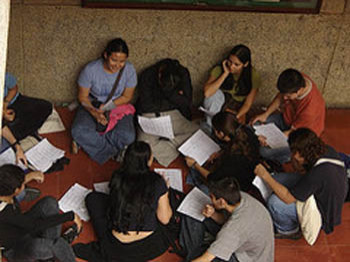Meet The NiNis: The Latin American Youth That Don't Work Nor Study; They Just Do Nothing

They are the victims, and the signs, of their times. They are a whole generation of young Latin Americans, between the ages of 15 and 29, who have either finished school or cannot afford to go, but are incapable of finding a job -- so they stopped trying. They are called “NiNis,” from the Spanish “ni estudian ni trabajan” (they do not study, nor do they work), and their numbers are growing all over the region.
In Mexico, they add up to 8 million, a quarter of the total of young people of university-going or career-starting age, according to data from the OECD.
Experts point at several different reasons, from drug abuse to school failure to family problems. “There is not a homogeneous explanation,” said Rafael Rofman, lead Social Protection specialist at the World Bank.
The organization held a video conference Youth Summit from Mexico City, in which 30 young Mexicans explained their experiences in dealing with unemployment and job searching. Celenne Ramírez said that she has been looking for work for months, after trying to start a project that eventually failed. “I have started to branch out for positions far away from home and for less pay,” she said.
Aside from the difficulties of launching a career, many NiNis also encounter prejudices and lack of understanding. Astrid Estefanía Garibay, a 21-year-old from the Mexican capital, said that many people identify being young and unemployed with being lazy or uninterested. “People think ‘young’ and ‘NiNi,’ and they think about drug addicts and bums,” she said.
Uruguay was the other example studied by the World Bank. In the South American country, almost 40 percent of the young who do not study or work are not actively looking for a job. On top of that, 25 percent of Uruguayan women define themselves as “housewives,” which means they stopped working when they became mothers.
The World Bank pointed out that many of the Uruguayan NiNis are in a situation of social vulnerability, something that is not characteristic of Mexican NiNis, who can be found all across the social scale. But in Uruguay, 80 percent of NiNis live among the poorest 40 percent of the country.
The Uruguayan government, largely regarded as the most progressive in Latin America, has started to work toward improving the situation. Better social services and a larger unemployment fund are part of the government’s agenda, as is the promotion an environment more favorable to employment creation.
© Copyright IBTimes 2025. All rights reserved.





















